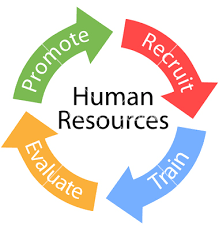
Introduction to Human Resource Management
Human Resource Management
•French Wendell, defines ―Human resource management as the recruitment, selection, development, utilisation, compensation and motivation of human resources by the organisation.
•According to Edwin B. Flippo, ―Human resource management is the planning, organising, directing and controlling of the procurement, development, resources to the end that individual and societal objectives are accomplished.
OBJECTIVES OF HUMAN RESOURCE MANAGEMENT
•―The objectives of Human Resource Management, in an organisation, is to obtain maximum individual development, desirable working relationships between employers and employees and employees and employees, and to affect the moulding of human resources as contrasted with physical resources‖.
•(i)To ensure effective utilisation of human resources, all other organisational resources will be efficiently utilised by the human resources.
•(ii) To establish and maintain an adequate organisational structure of relationship among all the members of an organisation by dividing of organisation tasks into functions, positions and jobs, and by defining clearly the responsibility, accountability, authority for each job and its relation with other jobs in the organisation.
•(iii) To generate maximum development of human resources within the organisation by offering opportunities for advancement to employees through training and education.
•(iv) To ensure respect for human beings by providing various services and welfare facilities to the personnel.
•(v) To ensure reconciliation of individual/group goals with those of the organisation in such a manner that the personnel feel a sense of commitment and loyalty towards it.
•(vi) To identify and satisfy the needs of individuals by offering various monetary and non-monetary rewards.
Activities of Human Resource Management
•In order to achieve the above objectives, human resource management undertakes the following activities :
•(i) Human Resource Planning, i.e., determining the number and kinds of personnel required to fill various positions in the organisation.
•(ii) Recruitment, selection and placement of personnel, i.e., employment function.
•(iii) Training and development of employees for their efficient performance and growth.
•(iv) Appraisal of performance of employees and taking corrective steps such as transfer from one job to another.
•(v) Motivation of workforce by providing financial incentives and avenues of promotion.
•(vi) Remuneration of employees. The employees must be given sufficient wages and fringe benefits to achieve higher standard of living and to motivate them to show higher productivity.
•(vii) Social security and welfare of employees.


